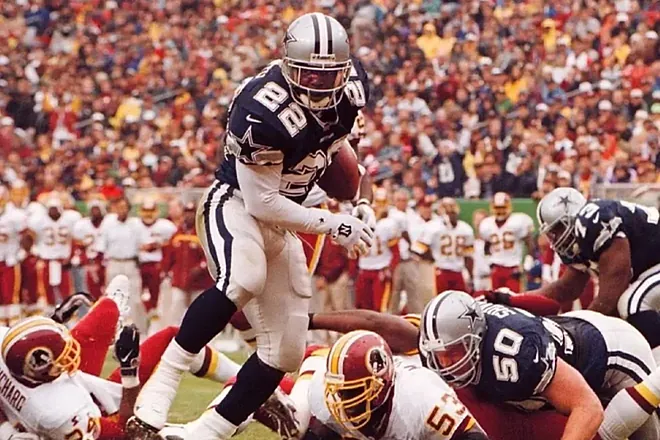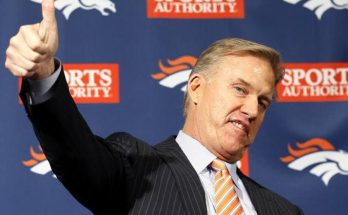Emmitt Smith has always been synonymous with excellence. The NFL’s all-time leading rusher, a three-time Super Bowl champion, and a face of the Dallas Cowboys dynasty of the 1990s, Smith’s name is etched into the very DNA of one of football’s most storied franchises. But lately, the Hall of Famer isn’t holding back—and his pointed criticism of the modern-day Cowboys has created shockwaves across the league and among fans.
It’s not the first time a legend has aired frustrations with his former team, but Smith’s words hit differently. This isn’t just a former player tossing out hot takes for media relevance. This is a man who built a legacy in Dallas, who helped transform “America’s Team” from a fading relic into a relentless juggernaut. And now, Smith is openly asking what many have wondered for years: What happened to the Cowboys?
Smith’s recent comments—delivered with unmistakable fire and disappointment—have laid bare the disconnect between the Cowboys’ current leadership and their championship pedigree. “It’s been 30 years,” he said in a nationally televised interview. “You know how long that is in football years? That’s generations. Whole generations of Cowboys fans have never seen this team win when it matters most. And that’s a shame. It’s a disgrace.”
That was just the beginning.
Smith, never one to mince words, continued his critique by slamming what he sees as a culture of complacency in Dallas. “You look at teams like Kansas City, even the Eagles lately, and you see urgency. You see accountability. You see progress. In Dallas? You see marketing. You see hype. But you don’t see rings,” he said. “We’re America’s Team—but we haven’t represented America’s expectations in decades.”
His frustration is shared by many, but coming from Smith, it stings in a way few other critiques could. The man bled for that star on his helmet. He ran through walls—literally—for a shot at greatness. He played with a separated shoulder to help deliver a division title. He didn’t just win; he sacrificed. And so when he questions the heart and soul of the modern Cowboys, people listen.
Smith didn’t single out individuals, but the implication was clear. Ownership. Coaching. Leadership. Preparation. Draft strategy. Player development. All of it. “You can’t just sell jerseys and stadium seats and expect that to be enough,” he said. “Winning is what made the Cowboys great. Not the glitz. Not the brand. Winning. And we’ve forgotten that.”
The Cowboys last hoisted the Lombardi Trophy in January of 1996, following the 1995 season. Since then, they’ve been a revolving door of promise and heartbreak, star-studded regular seasons followed by postseason collapses. Big-name quarterbacks like Tony Romo and Dak Prescott have come and gone or are approaching the twilight of their primes without even a conference championship appearance. Coaches have been hired and fired. Coordinators shuffled like deck chairs on a sinking ship. But the results? The same.
Smith pointed to what he calls a “disconnect between vision and execution.” In particular, he questioned the team’s long-term planning and inability to develop sustained success. “You can’t build a contender just by throwing money at big names or winning the offseason headlines. You need a foundation. You need leadership with guts. You need players who hate losing more than they love being famous,” he said.
His criticism landed especially hard when he brought up comparisons to the 90s Cowboys dynasty. “We had guys who held each other accountable. You think Michael [Irvin] was gonna let someone loaf through a practice? You think Charles Haley was gonna sit quietly while we coasted through a Monday film session? Hell no. We pushed each other because we wanted greatness. It wasn’t just about talent. It was about fire.”
That fire, Smith argues, has been missing for years.
The Cowboys of today, he says, are “too comfortable.” He didn’t shy away from suggesting that the atmosphere cultivated at The Star in Frisco—the team’s opulent headquarters—is part of the problem. “It’s like a luxury resort over there. Players walk in and everything’s handed to them. Gourmet meals, massage rooms, media spotlight… but none of that matters if you’re not winning championships.”
Smith’s comments weren’t entirely without hope. He acknowledged the team has had moments of brilliance—Dak’s early years, Micah Parsons’ arrival, and a handful of dominant regular season stretches—but he stressed that until it translates into postseason success, “none of it means a damn thing.”
“The fans deserve better,” he said. “Cowboys fans are loyal, passionate, and starved for a return to glory. And every year, we hype ourselves up just to watch it unravel. I’m tired of seeing that heartbreak. I’m tired of the excuses. I’m tired of the silence from people who should be demanding better.”
It’s unclear how Smith’s comments will be received inside the Cowboys organization, but the reaction from fans has been thunderous. Many took to social media to echo his sentiments, praising him for saying what they’ve been feeling for years. “When Emmitt speaks, we listen,” one fan posted. “He earned the right to speak the truth.”
Some critics suggested Smith was being too harsh, pointing out that the NFL’s landscape has changed dramatically since his playing days. Salary cap dynamics, free agency, and parity make dynasties harder to build and sustain. But Smith isn’t buying that as an excuse.
“Other teams have figured it out,” he responded. “The Patriots did it for two decades. The Chiefs are doing it right now. The 49ers, Bengals, Eagles—they’ve all built winners in recent years. The game has evolved, yes. But the core principles of winning haven’t. Discipline. Culture. Accountability. Passion. That’s timeless.”
Smith’s outburst raises larger questions about the role of former players in shaping the direction of their former teams. Should legends like Emmitt Smith be brought into the fold to consult, mentor, or even help establish culture? Or is their critique better delivered from the outside?
Whatever the answer, it’s clear that Smith still cares deeply about the Cowboys—perhaps too deeply to stay silent. His emotional investment is not rooted in bitterness, but in love for a franchise that helped define his life and career. And now, that love has turned to tough love.
He isn’t alone, either. Other former greats—Troy Aikman, Michael Irvin, Deion Sanders—have all, at various times, voiced similar frustrations. There’s a growing chorus of Cowboys legends who are no longer willing to play nice while watching the team drift further from its championship roots.
But Emmitt Smith’s voice, more than most, resonates with gravity. He was the relentless engine of the team’s golden era. And if the man who once carried the franchise on his back believes it’s lost its way, maybe it’s time for those in charge to start listening.
Because Smith isn’t just talking about a football team. He’s talking about identity, legacy, and the betrayal of a standard that used to define excellence. He’s talking about missed opportunities and wasted talent. About young players who don’t fully understand what the star on their helmet used to mean.
“If you’re not in this thing to win titles, then why are you here?” Smith asked near the end of his interview. “If you’re just here for the paycheck and the Instagram followers, go do something else. The Cowboys are supposed to be about greatness. And right now, we’re not even close.”
As the Cowboys prepare for another season, the pressure is higher than ever—not just from media, not just from fans, but now from the legends who made the team what it is. Emmitt Smith has spoken. The question is, will anyone inside the walls of The Star actually listen? Or will his words become just another chapter in a growing story of unfulfilled potential?
Because for a franchise built on legacy, there may be no harsher indictment than this: The greatest Cowboy of all time no longer believes in what the Cowboys have become.



